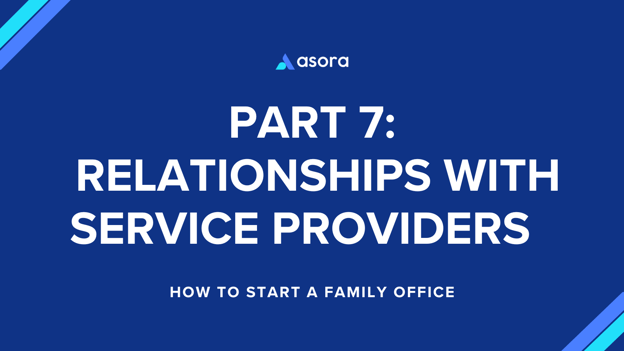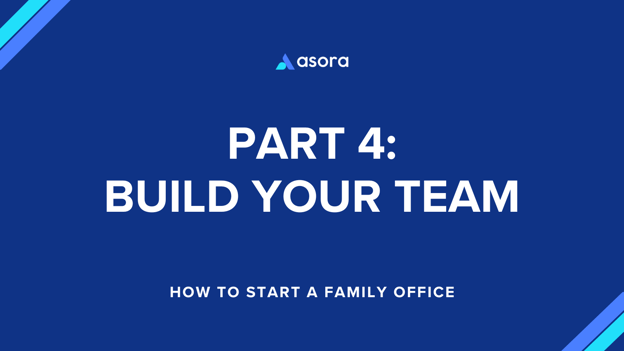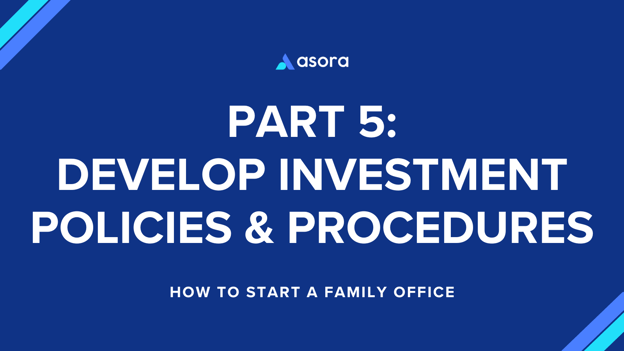Starting a family office is a significant undertaking that involves careful planning, organization, and implementation. A family office is a private advisory firm that serves one or more high-net-worth families and provides a range of services, including investment management, financial planning, tax planning, estate planning, and philanthropy. The main purpose of a family office is to preserve and grow family wealth over multiple generations.
This 7-part series is a guide on how to start a family office, where we discuss each part in detail every week.
Contents
Part 1: Define your purpose
Part 2: Decide between an SFO and MFO
Part 3: Set up systems and technology
Part 4: Build your team
Part 5: Develop investment policies & procedures
Part 6: Create a governance structure
Part 7: Establish relationships with service providers
Part 1: Define your purpose
It’s always important to start worth “Why?” The purpose of a family office could be anything from preserving and growing family wealth to supporting charitable causes. It's essential to have a clear understanding of the goals and objectives of the family office to develop the right structure, staffing, and investment strategy.
Part 2: Decide between an SFO and MFO
Choose between a Single-Family Office (SFO) or Multi-Family Office (MFO) depending on the size and complexity of your family's assets and needs. An SFO offers control, and an MFO provides shared resources and economies of scale. Consider the advantages and disadvantages and be open-minded. Many family offices are collaborating with other family offices or specialist advisers to help lighten the internal workload.
Part 3: Set up systems and technology
For your family office to be efficient and to provide decision-makers with the information and reports they need when they need it, you need to set up the right systems and technology. Consider what systems you are going to use for data aggregation, investment tracking and reporting, accounting, and team collaboration, as well as cybersecurity. Avoid being a technology laggard by having the right technology infrastructure to ensure your family office's long-term success.

Part 4: Build your team
Like all aspects of business, having the right talent on your team will determine your long-term success. Depending on the size and complexity of your family office, you may need a CEO or managing director, investment manager and/or analysts, accountants, and administrative support. Staffing needs will be a factor in the services the family office plans to offer, the size and complexity of the family's assets, and the budget.
Part 5: Develop investment policies & procedures
Your family office will need to set parameters for how the family’s assets are managed. It should have investment policies and procedures that outline how investments are selected, monitored, and managed. Formally documented investment policies and procedures will lead to better outcomes and reduce the risk of internal conflict over negative outcomes.
Part 6: Create a governance structure
You should establish a governance structure that outlines decision-making processes and define the roles and responsibilities of family members and team members. The governance structure should reflect the practical realities of how decisions are made within the family to ensure it is workable and embraced. You should consider also formalising communications with a family council that serves as a forum for family members to discuss family objectives and investment matters.
Part 7: Establish relationships with service providers
You will need to establish relationships with service providers, such as custodians, lawyers, accountants, and investment managers, to support your family office's operations. Choosing the right service providers and having a formal selection process and will ensure that the external team is aligned with the internal team on delivering on your family's values and objectives.
How to start a family office
Starting a family office can be a complex process, fortunately, other established family offices are typically very open to sharing experiences and helping – reach out and garner advice. Also, remember to communicate openly and transparently with family members and other stakeholders to ensure that everyone is aligned with the family office's objectives and governance structure. While such communication takes time it sets the foundation for long-term success.
Asora is a SAAS solution for single and multi-family offices to track and oversee assets, automating data capture and providing digital on-demand reporting on the web and mobile.
To learn more, schedule a demo with us.





